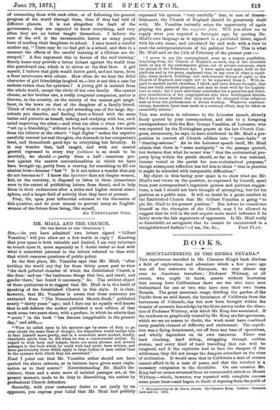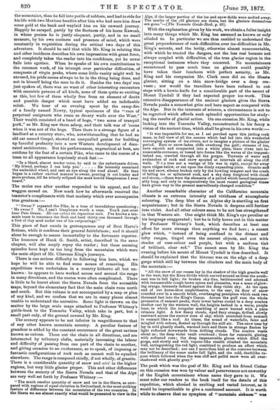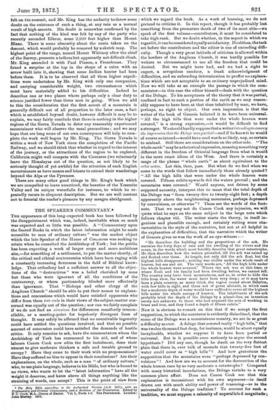BOOKS.
MOUNTAINEERING IN THE SIERRA NEVADA.* THE experiences recorded in Mr. Clarence King's book disclose a field of exploration and adventure which a few years ago was all but unknown to European, we may almost say even to American travellers ; Professor Whitney, at all events, who ought to know, asserts without hesitation that among born Californians there are ten who have seen Switzerland for one or two who have seen their own Sierra Nevada. The great mountain range dividing the garden of the Pacific from an arid desert, the luxuriance of California from the barrenness of Colorado, has but now been brought within the domain of accurate knowledge by the State survey under the direc- tion of Professor Whitney, with which Mr. King was associated. If the incidents so graphically related by Mr. King are fair specimens, which we see no reason to doubt, the work must have combined every possible element of difficulty and excitement. The expedi- tion was a flying detachment, cut off from any base of operations, and wholly dependent on its own resources. There was hard climbing, hard riding, struggling through sudden storms, and every kind of hard travelling that can well be imagined, and if the explorers had to face the dangers of the wilderness, they did not escape the dangers attendant on the vices of civilisation. It would seem that in California a man of science cannot afford to be a man of peace, and that the revolver is a necessary companion to the theodolite. On one occasion Mr. King had no sooner returned from an unsuccessful attack on Mount Whitney—which, however, was repeated with complete success some years later—and begun to think of reposing from the perils of * Mountaineering in the Sierra Nevada. By Clarence Hing. London : Sampson. Low and Co. 1872.
the mountains, than he fell into perils of robbers, and had to ride for his life with two Mexican bandits after him who had seen him draw some gold at the bank and waylaid him on his onward journey. Happily he escaped, partly by the fleetness of his horse Kaweah, in whose praises he is justly eloquent, partly, and in no small measure, by his own coolness and presence of mind, which were constantly in requisition during the critical two days of this adventare. It should be said that while Mr. King in relating this and other incidents describes his own impressions with great force, and completely takes the reader into his confidence, yet he never falls into egotism. When he speaks of his own contributions to the common work, of his triumph over particular difficulties, of conquests of virgin peaks, where some little vanity might well be excused, his pride seems always to be in the thing being done, and not in himself being the man to do it. Besides the two days' run just spoken of, there was no want of other interesting encounters with eccentric persons of all kinds, none of them quite so exciting as this, but few of them wholly free from an element of doubt and possible danger which must have added an indefinable relish. We bear of an evening spent by the camp-fire of a family named Newty, typical specimens of the "race of perpetual emigrants who roam as dreary waifs over the West." Their wealth consisted of a band of hogs, "two acres of tranquil pork," as Mr. King saw them asleep, and their talk was of 'coons when it was not of the hogs. Then there is a strange figure of a landlord at a country store, who, notwithstanding that he had an old cat named Gospel, showed an unequalled genius for building up fanciful profanity into a new Western development of deco- rated architecture. But his performances, unpractical at best, are outdone by the feat of a certain Pike, who came to the rescue of a team to all appearance hopelessly stuck fast :- "In a bland, almost tender voice, he said to the unfortunate driver, 'My friend, perhaps I can help you . ' He leisurely examined the embedded wheel, and cast an eye along the road ahead. He then began in a rather excited manner to swear, pouring it out louder and more profane, till he utterly eclipsed the most horrid blasphemies I ever heard."
The mules one after another responded to his appeal, and the waggon moved on. Now mark how he afterwards received the teamster's compliments with that modesty which ever accompanies true greatness:—
" Swear ?' repeated the Pike, in a tone of incredulous questioning; Me swear ? No, I can't blaspheme worth a cuss. You'd just orter hear Pete Green. He can exhort the impenitent mule. I've known a ten- mule team to renounce the flesh and haul thirty-one thousand through a foot of clay mud under one of his outpourings.'"
This piece of fact excels in grotesqueness any of Bret Harte's fictions, while it confirms their general faithfulness ; and it should alone be enough to assure immortality to the fortunate reporter. The humours of Hank G. Smith, artist, described in the same chapter, will also amply repay the reader ; but these amusing episodes have kept us too long from the mountains which were the main object of Mr. Clarence King's journeys.
There is one serious difficulty in following him here, which we hope he will be able to find some means of removing. His expeditions were undertaken in a country hitherto all but un- known: he appears to have worked across and around the range in many directions, and the routes were often complicated. There is little to be learnt about the Sierra Nevada from the accessible maps, beyond the elementary fact that the main chain runs north and south. But this volume is not accompanied by a map or plan of any kind, and we confess that we are in many places almost unable to understand the narrative. Some light is thrown on the matter by the large scale maps attached to Professor Whitney's guide-book to the Yosemite Valley, which take in part, but a small part only, of the ground covered by Mr. King.
The scenery appears to be not inferior in magnificence to that of any other known mountain country. A peculiar feature of grandeur is added by the constant occurrence of the great ravines known as cations. These cut the chain in all directions, and are intersected by tributary clefts, materially increasing the labour and difficulty of passing from one part of the chain to another, and giving occasion to an exuberance, so to speak, of imposing or fantastic configurations of rock such as cannot well be equalled elsewhere. The range is composed chiefly, if not wholly, of granite. There is a considerable quantity of snow and neve in the higher regions, but very little glacier proper. This and other differences between the scenery of the Sierra Nevada and that of the Alps are very well set forth by Professor Whitney :— "The much smaller quantity of snow and ice in the Sierra, as com- pared with regions of equal elevation in Switzerland, is the most striking feature of difference between the mountains of the two countries. In the Sierra we see almost exactly what would be presented to view in the Alps, if the larger portion of the ice and snow-flelds were melted away. The marks of the old glaciers are there, but the glaciers themselves, are gone."—(The Yosemite Guide-Hook, p. 89).
With the explanation given by his work, we obtain a fuller insight. into many things which Mr. King has assumed as known or only alluded to. In particular we are thus enabled to understand the great preponderance of rock-difficulties over ice-difficulties in Mr. King's ascents, and the levity, otherwise almost unaccountable, with which he treated the dangers, not the less real because not- always coupled with difficulties, of the true glacier region in the exceptional instances where they occurred. No mountaineers accustomed to pass much time on glaciers could possibly have taken their luncheon with perfect serenity, as Mr. King and his companion Mr. Clark once did on the Shasta glacier, sitting on a thin snow-bridge over a deep cre- vasse; nor would the travellers have been reduced to cut. steps with a bowie-knife for a considerable part of the ascent of Mount Tyndall if they had expected proper ice-work. This extensive disappearance of the ancient glaciers gives the Sierra- Nevada peaks a somewhat grim and bare aspect as compared with. the Alps. But in the interests of science, a circumstance is not to be regretted which affords such splendid opportunities for study- ing the results of glacial action. On one occasion Mr. King, while- looking into the Yosemite Valley, reconstructed in his fancy a. vision of the ancient time, which shall be given in his own words :— " It was impossible for me, as I sat perched upon this jutting rock mass, in full view of all the canons which had led into this wonderful, converging system of ice-rivers, not to imagine a picture of the glacier period. Bare or snow-laden cliffs overhung the gulf ; streams of ice, here smooth and compacted into a white plain, there riven into in- numerable crevasses, or tossed into forms like the waves of the tempest- lashed sea, crawled through all the gorges. Torrents of water and avalanches of rock and snow spouted at intervals all along the cliff walls. N, t a tree nor a vestige of life was in sight, except far away upon ridges below, or out upon the dimly expanding plain. Granite and ice and snow, silence broken only by the howling tempest and the crash, of falling ice or splintered rock, and a sky deep freighted with cloud and storm,—these were the elements of a period which lasted immeasur- ably long, and only in comparatively the most recent geological tinier have given way to the present marvellously changed condition."
Another remarkable character of the Californian mountain climate is an extreme intensity and vividness of atmospheric- colouring. The deep blue of an Alpine sky is startling on first acquaintance ; but in the Sierra Nevada it deepens still further into violet. And all other colours seem to be not leas strengthened in that Western air. One might think Mr. King's eye peculiar or his language exaggerated ; but he is fully borne out in this matter by Professor Whitney's book, which describes at least one effect far more strange than anything we find here ; a sunset glow which, "instead of being confined to the distant and' lofty ranges, tinged even the nearest objects, and not with shades of rose-colour and purple, but with a uniform tint of brilliant, clear red." The sunset seen by Mr. King the evening before his ascent of Mount Tyndall is thus described. It should be explained that the bivouac was on the edge of a deep. gorge which still lay between the climbers and the main body of the mountain:— " All the snow of our recess lay in the shadow of the high granite waif to the west, but the Kern divide which curved around us from the south- east was in full light; its broken sky-line, battlemented and adorned with innumerable rough-hewn spires and pinnacles, was a Millis of glow- ing orange, intensely defined against the deep violet sky. At the open end of our .horse-shoe amphitheatre, to the east, its floor of snowr rounded over in a smooth brink, overhanging precipices which sank two- thousand feet into the King's Canon. Across the gulf rose the whole procession of summit peaks, their lower halves rooted in a deep sombre shadow cast by the western wall, the heights bathed in a warm, purple haze, in which the irregular marbling of snow burned with a pure. crimson light. A few fleecy clouds, dyed fiery orange, drifted slowly eastward across the narrow zone of sky, which stretched from summit to summit like a roof. At times, the sound of waterfalls, faint and mingled with echoes, floated up through the still air. The snow near by lay in cold ghastly shade, warmed here and there in strange flashes by light reflected downwards from drifting clouds. The sombre waste about us ; the deep violet vault overhead ; those far summits, glaring with reflected rose; the deep impenetrable gloom which filled the gorge, and slowly and with vapour-like stealth climbed the mountain. wall, extinguishing the red light, combined to produce an effect which. may not be described ; nor can I more than hint at the contrast between. the brilliancy of the scene under full light, and the cold, deathlike re- pose which followed when the wan cliff and pallid snow were all over- shadowed with ghostly gray."
The peak which was the goal of Mr. King and his friend Cotter on this occasion was won by valour and perseverance not unworthy of the English mountaineer whose name they gave to it. We must refer our readers to the book itself for the details of this expedition, which abotind in exciting and varied interest, as it would be impracticable to give a condensed account. It is worth while to observe that no symptom of "mountain sickness " was felt on the summit, and Mr. King has the audacity to throw some doubt on the existence of such a thing, at any rate as a normal result of high ascents. His doubt is somewhat confirmed by the fact that nothing of the kind was felt by any of the party who recently ascended Elbruz, some 2,000 feet higher than Mount Blanc. There is some obscurity about the route taken on the descent, which would probably be removed by a sketch map. The highest point of the range, named Mount Whitney after the chief of the Survey, presents a tedious but apparently not difficult climb. Mr. King ascended it with Paul Pinson, a Frenchman. They found a surprise at the top in the shape of a cairn with an arrow built into it, showing that some Indian hunter had been before them. It is to be observed that all these higher expedi- tions were undertaken by Mr. King with only one companion, and carrying considerable weight, two circumstances which must have materially added to his difficulties. Indeed he describes one or two places where perhaps only a clear duty to science justified fewer than three men in going. When we add to this the consideration that the first ascent of a mountain is generally difficult out of all proportion to the later ones, a fact which is established beyond doubt, however difficult it may be to explain, we may fairly conclude that there is nothing in the higher regions of the Sierra_ Nevada to deter any reasonably experienced mountaineer who will observe the usual precautions ; and we may hope that ere long some of our own countrymen will help to com- plete the work well begun by Mr. King. The Sierra Nevada is within a week of New York since the completion of the Pacific Railway, and we should think that whether in regard to the interest of the journey, or the attractions of the region to be explored, California might well compete with the Caucasus (we reluctantly leave the Himalayas out of the question, as not likely to be seriously thought of yet awhile) for the attention of such English mountaineers as have means and leisure to extend their wanderings beyond the Alps or the Pyrenees.
There are many other good things in Mr. King's book which we are compelled to leave unnoticed, the beauties of the Yosemite Valley and its unique waterfalls for instance, to which he re- peatedly recurs in eloquent description. But we are well content not to forestal the reader's pleasure by any meagre abridgment.




































 Previous page
Previous page